10 citations,
October 2018 in “Journal of molecular and cellular cardiology/Journal of Molecular and Cellular Cardiology” The gene NM_026333 slows down aging by affecting the NCX1 pathway and could be targeted for anti-aging treatments.
 January 2024 in “Archives of dermatological research”
January 2024 in “Archives of dermatological research” Both treatments for alopecia areata showed similar modest effectiveness.
 December 2022 in “Proceeding Bengkulu International Conference on Health”
December 2022 in “Proceeding Bengkulu International Conference on Health” Celery extract hair gel at 5% concentration is best for making hair gel.
 54 citations,
September 2000 in “Archives of dermatology”
54 citations,
September 2000 in “Archives of dermatology” A hair-straightening product caused widespread hair loss and scalp injuries, mainly affecting African American women.
 47 citations,
January 2017 in “RSC Advances”
47 citations,
January 2017 in “RSC Advances” Keratin peptides can change hair shape gently without harsh chemicals.
 37 citations,
February 2014 in “Journal of Dermatology”
37 citations,
February 2014 in “Journal of Dermatology” Valproic acid increases hair count in men with hair loss.
 34 citations,
January 1943 in “Endocrinology”
34 citations,
January 1943 in “Endocrinology” Adrenalectomy boosts hair growth and melanin in black rats, even with vitamin B¹ deficiency.
 31 citations,
January 2016 in “Drugs - Real World Outcomes”
31 citations,
January 2016 in “Drugs - Real World Outcomes” Some new oral anticoagulants may also cause hair loss and might not be better than traditional ones for preventing hair loss.
 27 citations,
August 2018 in “Therapeutic Delivery”
27 citations,
August 2018 in “Therapeutic Delivery” Nanotechnology could make hair loss treatments more effective and reduce side effects, but more research is needed before it's available.
 24 citations,
April 2017 in “Oncology Reports”
24 citations,
April 2017 in “Oncology Reports” The hair keratin gene KRT81 is found in both normal and breast cancer cells and helps them invade surrounding tissues.
 12 citations,
December 2009 in “Amino Acids”
12 citations,
December 2009 in “Amino Acids” Putting α-methylspermidine on mouse skin can start hair growth.
 11 citations,
June 2012 in “Acta histochemica”
11 citations,
June 2012 in “Acta histochemica” Mice with a Gsdma3 gene mutation have thicker skin and longer hair follicle openings due to increased β-catenin levels.
 8 citations,
May 2019 in “Indian Journal of Plastic Surgery/Indian journal of plastic surgery”
8 citations,
May 2019 in “Indian Journal of Plastic Surgery/Indian journal of plastic surgery” Plasma is better than Ringer's lactate for hair graft survival and growth after transplantation.
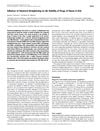 8 citations,
October 2014 in “Journal of analytical toxicology.”
8 citations,
October 2014 in “Journal of analytical toxicology.” Chemical hair straightening significantly reduces detectable drug levels in hair.
 7 citations,
August 2018 in “Journal of cosmetic dermatology”
7 citations,
August 2018 in “Journal of cosmetic dermatology” Chemical hair straightening improves smoothness and shine but may cause side effects, suggesting a need for safer methods.
 7 citations,
September 2008 in “Dermatologic surgery”
7 citations,
September 2008 in “Dermatologic surgery” Hair transplantation can successfully treat stubborn alopecia areata.
 6 citations,
April 2020 in “Applied sciences”
6 citations,
April 2020 in “Applied sciences” Hair growth medium helps heal wounds and regrow hair in mice.
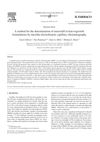 6 citations,
July 2005 in “Farmaco”
6 citations,
July 2005 in “Farmaco” A quick and simple method was created to identify minoxidil in hair-growth products using micellar electrokinetic capillary chromatography.
 6 citations,
October 1997 in “CNS Drugs”
6 citations,
October 1997 in “CNS Drugs” Psychotropic drugs can cause hair loss or excessive hair growth.
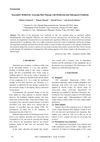 4 citations,
January 2007 in “Sen'i Gakkaishi”
4 citations,
January 2007 in “Sen'i Gakkaishi” Permed hair degrades faster and shows more damage after protease treatment compared to untreated hair.
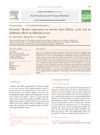 3 citations,
February 2014 in “Asian Pacific journal of tropical medicine”
3 citations,
February 2014 in “Asian Pacific journal of tropical medicine” Wnt5a may slow down hair growth in mice.

Topical valproate can effectively promote hair growth.
 1 citations,
December 2021 in “International journal of research in dermatology”
1 citations,
December 2021 in “International journal of research in dermatology” Dermatologists should learn more about shampoos to better treat hair and scalp issues.
 May 2024 in “Indian journal of pharmacy and pharmacology”
May 2024 in “Indian journal of pharmacy and pharmacology” Luliconazole is more effective than ketoconazole at repairing damaged hair cuticles.
 February 2019 in “bioRxiv (Cold Spring Harbor Laboratory)”
February 2019 in “bioRxiv (Cold Spring Harbor Laboratory)” The gene Prss53 affects hair shape and bone development in rabbits.
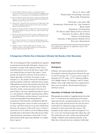 February 2015 in “Dermatologic Surgery”
February 2015 in “Dermatologic Surgery” Smaller reticle sizes are as accurate as the standard size for measuring hair density in hair restoration.
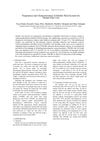 January 2013 in “Transactions of the Materials Research Society of Japan”
January 2013 in “Transactions of the Materials Research Society of Japan” CMADK reduces hair damage from bleaching and permanent waving.
 August 1994 in “Drugs & Therapy Perspectives”
August 1994 in “Drugs & Therapy Perspectives” Some drugs can cause hair loss or growth, but hair usually returns to normal after stopping the drug.
 November 2019 in “Actas Dermo-Sifiliográficas”
November 2019 in “Actas Dermo-Sifiliográficas” Oral minoxidil helps treat hair loss and has reversible side effects.
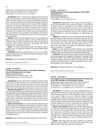 September 2011 in “Clinical Biochemistry”
September 2011 in “Clinical Biochemistry” Certain sugars increase in some layers of the hair follicle during the middle of the healing process in rats, which may help improve healing.




























